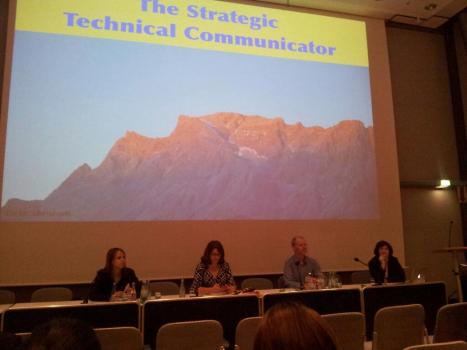Marijana Prusina, Nicky Bleiel, Sarah O’Keefe and Dr. Tony Self pooled their experience in an interesting and versatile panel session about the more strategic aspects of our profession.
It was not so much a discussion as a fast-paced session of the experts sharing their thoughts on strategic issues and problems, so I’ll simply list some of the insights:
- Domain knowledge for a certain industry (as opposed to general tech comm skills) can be a great asset that you can use to build a career on, but it’s not necessary to become an expert in any one domain.
- To get a mandate or money from management, don’t argue in terms of quality, but rather in terms of cost: Show how improving documentation will either reduce cost or create additional revenue.
- Freelancing can work well, but you will need some things which are less essential if you are employed:
- Considerable project management skills – even if only for your own projects
- A good network of satisfied customers, other people who know and like your work, and other freelancers with whom you can exchange tips and tricks – and maybe even projects if they’re better skilled to take them on or when you are busy.
- A snappy definition of your core services, skills and profile.
- To improve the reputation of tech comm and exert influence in your company, try these strategies:
- Volunteer, if you can afford to, whether in a professional tech comm association or a standards committee.
- Underpromise and overdeliver on your deliverables – and meet the deadlines you agree to.
- Write a book – but be aware that you’ll mainly do it for marketing and influence: It’s a lot of work, and it won’t make you rich.
- Be the advocate of users, who are satisfied, more productive and less costly to your tech support thanks to good documentation.
- Take all the training that makes sense to you and that you can get. Don’t forget about domain skills and software-related skills, for example, for API documentation. When training, keep in mind your resumé and what value you will add to your customers or your employer by adding a certain skill.
Filed under: conferences, managing, technical communication | Tagged: Dr. Tony Self, marijana prusina, Nicky Bleiel, sarah o'keefe, tekom12 | Leave a comment »




